Disappearing Clicks
When Compete.com launched with credits-based pricing well over a decade ago I felt like a kid in a candy store using their competitive research tool. Recently Compete.com announced they were shutting down, but many of the link analysis & competitive research tools which leverage scraping have also started licensing clickstream data from sources like Clickstre.am & JumpShot.
These sorts of features add a lot of value to traditional keyword tools, as they can highlight the CTR on ads vs organic results & show if people click on anything after they search for a particular term.
When I read Ahref's recent blog post about integrating clickstream data I got that same kid in a candy store feeling I got when I first used Compete. Some highlights...
- their keyword database contains over 3 billion keywords
- they offer localized search volumes
- searches with clicks vs searches without clicks
- clicks per search
- repeat searches metric
- organic vs ad clicks
As an example of how the searches with clicks feature is helpful, consider Google's recently announced RGB conversion feature
In that image you can see how the feature displaces the result set.
What's cool about the Ahrefs feature is you can also see what sort of impact that feature has on click volumes.
After 1 month, 20% of the searches for [RGB to HEX] no longer had any clicks to an external website.
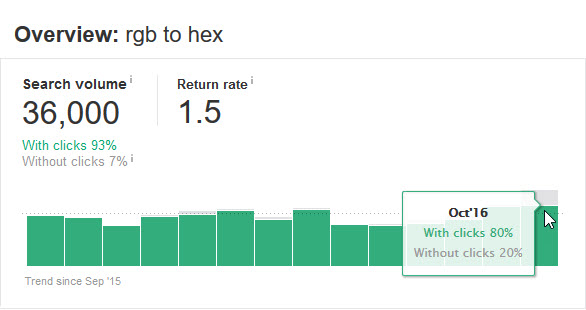
On the second month it looks like the "no click" rate was closer to 7%, so perhaps some of the initial additional search volume was driven by people searching for the related keywords after blogs covered the new feature.
But the nice thing about the feature is you can see how the click rate changes over time as the feature evolves.
In some areas like weather Google ends up dominating most the user behavior with their in-SERP feature.
About half of all weather keyword searches do not click on any listings. And then of those which do click, about 20% of people click on an ad.

That means the potential organic click volume for that keyword is only about 40% of the initial search volume estimates.
Search results keep getting more interactive features & some of them appear to be click black holes. Literally...
You guys, I've discovered a SERP black hole! I'm on #200 suggested PAA for this SERP?! Has anyone else seen an infinite PAA SERP before? pic.twitter.com/YgZDVWdWJ9— Britney Muller (@BritneyMuller) November 23, 2016
Here is a new item comparison feature table.
Has anyone ever seen this giant 'vs' featured snippet before? @STATrob @glenngabe @jenstar pic.twitter.com/qaKToKm5C4— Jesse Semchuck (@jessesem) November 22, 2016
As more of the value chain appears in the search results, more of the value chain which formerly appeared on websites disappears. This is true from a wide range of aspects including ad sales, content hosting, ad blocking & brand value.
General Ad Sales
No click into the publisher's site means no ad revenue for the publisher. Voice search will only accelerate the declines seen from mobile, which shifted user attention away from large screens with many listings to smaller screens with fewer listings & a far higher ad ratio in the search results.
Facebook Instant Articles & Google AMP
Google has already pushed hard to make hotel searches a pay-to-play vertical & yet some publishers are adopting AMP formatting in that vertical. Google is also forcing AMP down publisher's throats in other verticals like recipes.
@rustybrick New? pic.twitter.com/91TzKfS7tn— Jon Hogg (@ItsHogg) November 24, 2016
If central ad networks host your content then they get better user data for your content than you do as a publisher.
User Tracking, in Aggregate
Increased user tracking depresses premium ad sales & moves value from niche players to broad networks "Whether it’s a third party like Facebook or Google tracking across the web or an ISP leveraging its distribution arm, this is outside of consumer expectations. Importantly to the digital media industry, it also devalues the context and relationship of consumer trust which drives the businesses of premium publishers."
Ad Blocking
Some large sites like Google or Facebook either pay ad blockers or technically work around them within their apps. By funding ad blockers exempting the search result page from having their ads blocked, Google is ultimately defunding competing ad networks.
Brand Value
As search results get noisier & more ad heavy, Google is trying to coerce brands into re-buying their pre-existing brand equity. These efforts are effective, as on some branded & navigational searches over half the click volume goes to the ads. Here are a few examples from Ahrefs. The orange bar shows what percent of the SERP clicks are on ads.
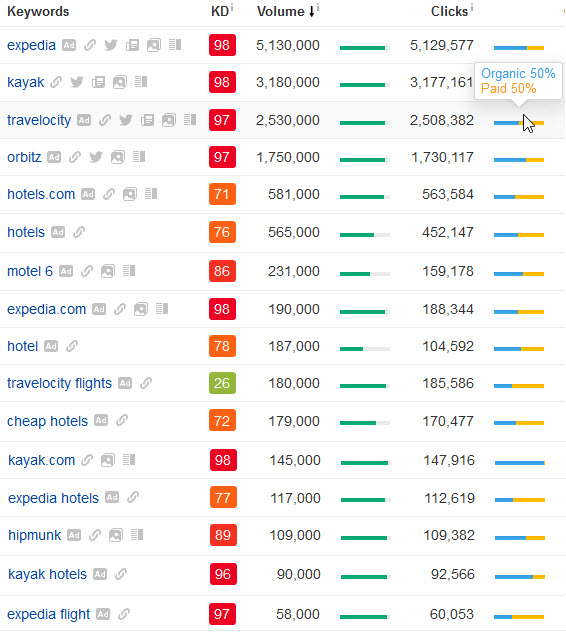
And the above doesn't even account for...
- Google Maps being an ad-heavy search engine.
- the Google Trips app which prevent searches from happening on Google.
- The mid-tail of travel search on mobile where Google does away with the concept of organic search results.
- Direct booking features complementing traditional AdWords ads & hotel price ads.
- Google buying ITA Software to dominate flight search. Notice the most popular term is Google's branded term & for the generic term [flights] 72% of people don't click on any external site while 37% of the remaining 28% of searches click on an AdWords ad.
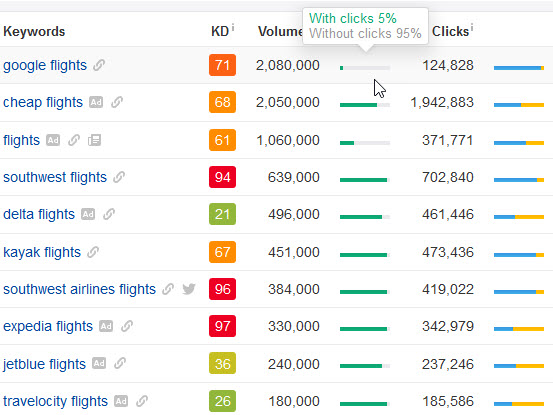
And almost everyone else in that industry is stuck licensing flight data from Google, as they own ITA Software.
So Google is eating the generic terms, the brand terms, and the search query pool more broadly.
There's a reason Google's online travel business is over twice the size of anyone else & has their biggest advertisers seeking more sustainable & more legitimate alternatives.
The biggest travel players are accustomed to Google’s moves and trying their best to adjust and work around them. Missing from this story is the fact that Google’s latest moves are making it nearly impossible for all but the smallest number of consumer travel startups to succeed. — Dennis Schaal
And some of the aggressive stuff carries over into other lines of business outside of travel. Google is also testing large image extensions on AdWords ads on cell phones that don't leave room for even a second AdWords listing on the screen. When one invests in brand they have to start thinking about how much they are willing to pay Google as an ongoing tithing for their success. Look at the following ads where a competitor bidding on a competing brand drives the brand owner's official site below the fold.
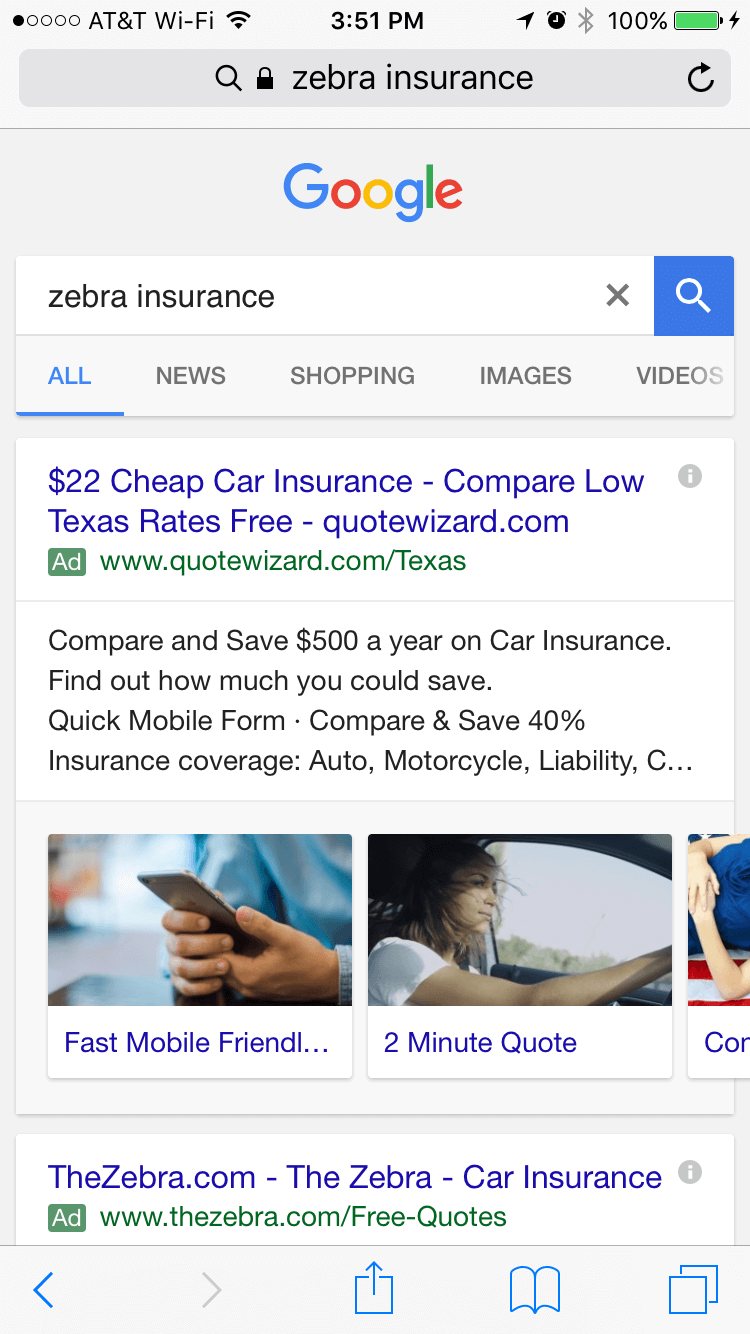
Google is willing to make their results worse (to the point they would consider something that looked like their search result page as an ad-heavy doorway redirect page of spam if hosted by anyone other than themselves) in order to monetize navigational searches.
What's more, you can't just opt out & ignore. When brands make agreements to not cross-bid Google has the FTC sue them.
On some high end fashion brands Google lists shopping ads which lead to third party sellers who sell used goods. Quite often counterfeits will also be in the mix. When the counterfeits are destroyed in the first wash, it is the brand owner who was took to the cleaners.
But there's a solution to that... they can pay Google ever-increasing protection.
@seobook sadly true. I work in the luxury fashion and CTR<15% for nav queries especially w/ sales, forced to buy own brand kw @andrealpar— Giuseppe Pastore (@Zen2Seo) November 26, 2016

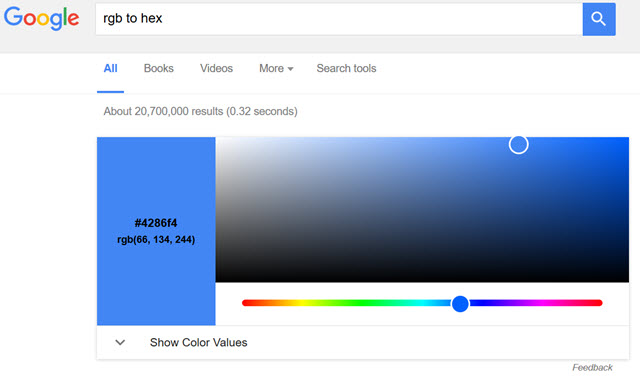



Comments
Great article. Can I please ask how do you measure brand value?
...a number of global brand ranking surveys which aim to highlight the most valuable brands in the world.
There are many ways to measure it beyond those. Some examples...
In isolation the above sorts of numbers may be meaningless. But there are tools like SimilarWeb which allow you to compare site A vs site B & site C quite easily for benchmarking.
Of course, it is not just where any data point it at a static moment in time that matters, but also the trend.
Different businesses can also look at things like lifetime customer value, open rates of emails, how frequently their brand is discussed on social media & across the web, and so on.
One other nuance when comparing metrics, trends, ratios, etc. ... sometimes a site can look good on one number because it is performing poorly on another. For example, a high percent of brand queries could indicate you have a strong brand BUT it could also indicate there are internal site SEO issues like no page titles, heavy content duplication, or other issues holding down the rankings of internal pages ... so really all the sort of comparison of A vs B is nuanced & dependent on looking at numerous metrics rather than just looking at any individual thing in isolation.
Hi Aaron,
Across most, if not all of your posts, you are clearly against ads. I first started out as an SEO, then moved to PPC. Now, *in my opinion*, I find PPC ads far more useful and appealing than organic results for commercial queries. So when I want to buy something, I actively look for PPC ads. This is the complete opposite to what I was previously doing before working in PPC.
I think ads are more relevant because the advertiser is paying, so wants to maximise results, and has full control over the ad and the landing page. With SEO, you optimise, then sit and hope for the best, while Google has all the control over how your results appear. You may write only page title and meta description, only for Google to replace it as they see fit.
I use an ad blocker extensively but have chosen to allow PPC ads in the results for reasons mentioned above.
One thing which hasn't been written much about online is how Google and Apple own their smartphones and their app stores. They are the manufacturers, OS owners as well as gate-keepers to the app stores. This is completely monopolistic behaviour and kills competition, yet hardly anyone says anything about this.
If you want to install an app, you have to go to their app store; you can't go to say skype.com to find and install the app. I have previously installed Cyanogen OS but I still had to install Google's app in order to access the app store to install skype's app. I didn't want to have anything Google-related on my phone, but did not have a choice.
In the PC world, it would be like Microsoft manufacturing the PC, as well as developing the OS and selling all software exclusively through their site. Even they did not behave like this.
...extensive coverage of Google's bundling efforts on mobile. The European Commission's anti-trust enforcement division is investigating Android. Ben Edelman also covered their illicit tying/bundling programs which were leaked in a court case when secret partner documents became evidence.
Perhaps the reason the issues in adjacent markets are not highlighted as much in the SEO industry is it makes more sense for consultants to pitch every change as a new channel / opportunity / billable service.
I also saw the lockdown/control stuff coming way back in 2009, when I explained why I refused to create any SEO-related extensions for Google Chrome.
I do see some people pitching the idea of Podcasting becoming a new multi-billion Dollar industry & such, but really I don't buy it. I think if anyone started to create adjacent profits Google & Apple would clamp down with higher revenue sharing or free alternatives until the competition was destroyed, then jack up their take rate.
Sadly, Microsoft is also clamping down on 3rd party software installation ... they are following the Google / Apple lead.
In terms of these bits...
I am not against ads, but rather monopolistic bundling & guidelines which are not only selectively enforced but also something that do not apply to the guideline makers.
An increasing percent of people are starting their search at Amazon.com rather than a general purpose web search tool.
My guess is your appreciation of paid search ads is more because the job shift rather than the ads drastically improving in relevancy.
I agree that irrelevancy is taxed & there is incentives to align things, but I also recall things like...
Yes SEO can be less reliable, but then in large part that is largely a reflection of Google's interests in diverting investments around the channel / across to paid search ads.
That said, when it does work well SEO can be a cleaner end user experience because there isn't as much need for incremental revenues to make the numbers back out. In many paid search markets businesses are sort of forced to operate at the sleaziest level possible to stay competitive. Not all markets are this way, but a couple that are top of mind...
Oh, and publishers were never forced to use AMP. All they had to do was ignore it and it would never have had traction.
Same for that old nofollow link attribute. Google put it out there but everyone could have ignored it. But people threw themselves at it to the extent of nofollowing their whole website.
Sometimes, you can't put the blame at Google's feet but at publishers who keep shooting themselves in the foot...
...forced many publishers into AMP.
If you are not profitable as a company (or are marginally profitable with almost all the numbers moving in the wrong direction) then it is hard to opt out of such features and have any sort of growth story to sell.
No growth + unprofitable = death.
News publishers who opted NOT to use AMP often saw a 50% decline in search traffic.
Most traffic to news sites does not go to older stories in the archives but to newer breaking stories. If only a handful of competitors are in AMP and you are not, then your stuff better be good enough to justify a paywall, because the preferential placement of the AMP carousels guarantees whoever is not in it can not afford to make their numbers back out UNLESS they monetize via some means other than ads.
There's a reason a huge & influential news organization like The Washington Post sold for only $250 million & most other big news publishers have seen a decade-straight decline in valuations. They're desperate & many of the big players are hoping to win via "last man standing" strategy.
Thanks for the comments :)
Add new comment